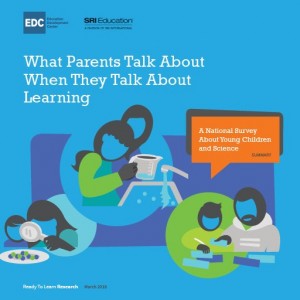Guest post: New study on parents’ confidence and support for children’s science learning
The following is part of a series of guest posts by leaders in the field of early learning. This guest post is by Shelley Pasnik, vice president of Education Development Center (EDC).

As researchers, we know that children’s early science exploration can lay the foundation for their becoming critical thinkers and lifelong problem solvers.
Yet according to a new national study, approximately half of the parents of young children who were surveyed are not “very confident” they can support their children’s science learning.
 The study, titled What Parents Talk About When They Talk About Learning: A National Survey About Young Children and Science, is based on interviews with more than 1,400 parents nationwide. Findings indicate that, regardless of income level, parents want their kids to have a strong start in the sciences and feel that concrete supports and activities would help them engage their children in science exploration.
The study, titled What Parents Talk About When They Talk About Learning: A National Survey About Young Children and Science, is based on interviews with more than 1,400 parents nationwide. Findings indicate that, regardless of income level, parents want their kids to have a strong start in the sciences and feel that concrete supports and activities would help them engage their children in science exploration.
We want parents and caregivers to know that the habits of mind and curiosity that they can encourage are much more important than being able to provide the “right” answers to the science questions their kids have. Modeling an enthusiasm for science learning and building on their kids’ natural inquisitiveness by asking questions and looking for answers together can go a long way toward supporting science literacy.
The survey report includes recommendations for lowering barriers that parents face in helping their kids learn science. We think that increasing awareness of opportunities to engage kids in early science learning at home and in the community is critical, especially in ways that seamlessly integrate with parents’ regular routines and that don’t require lots of time or expensive materials. In addition, connecting parents to fun, developmentally appropriate science content that models ways to engage with science concepts, practices, and activities is also key to increasing parents’ confidence.
The survey was conducted by education researchers at Education Development Center (EDC) and SRI International and was commissioned by the CPB-PBS Ready To Learn Initiative, which is funded by Congress and the U.S. Department of Education and supports the development of resources for families. Additional science-rich resources are available at PBS KIDS, PBS KIDS For Parents and the PBS KIDS YouTube channel.
ABOUT THIS POST
Shelley Pasnik is vice president of Education Development Center (EDC), a global education and health nonprofit.
The contents of this blog were developed under a grant from the Department of Education. However, those contents do not necessarily represent the policy of the Department of Education, and you should not assume endorsement by the Federal Government. The project is funded by a Ready To Learn grant (PR/AWARD No. U295A150003, CFDA No. 84.295A) provided by the Department of Education to the Corporation for Public Broadcasting.